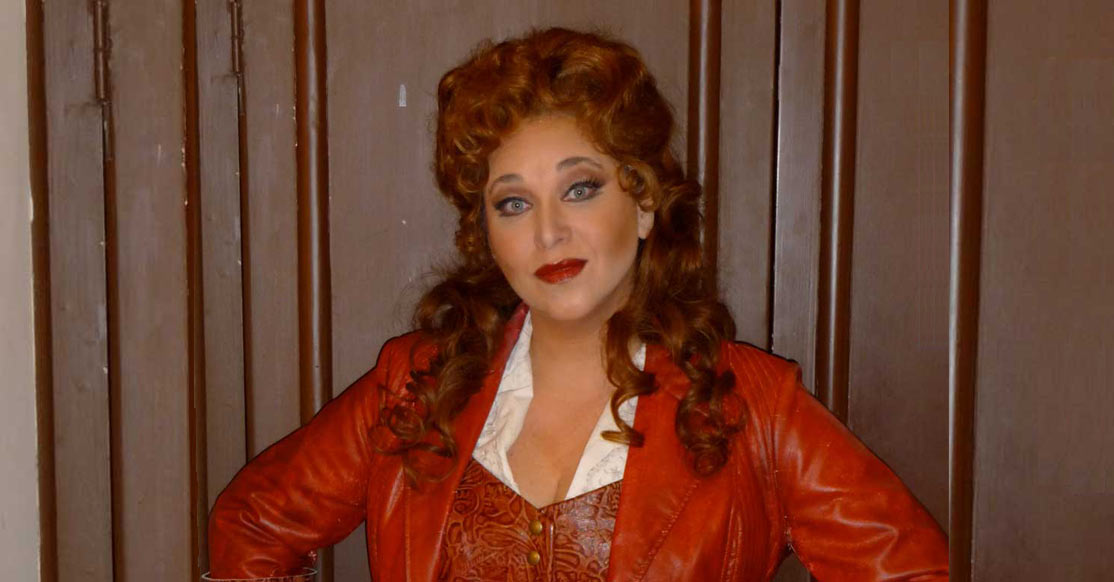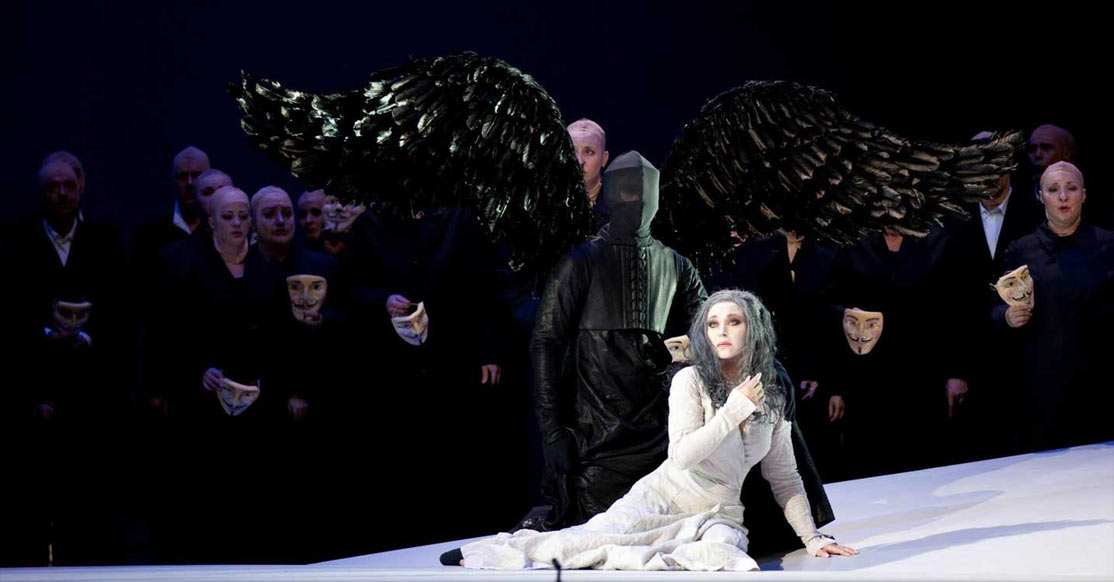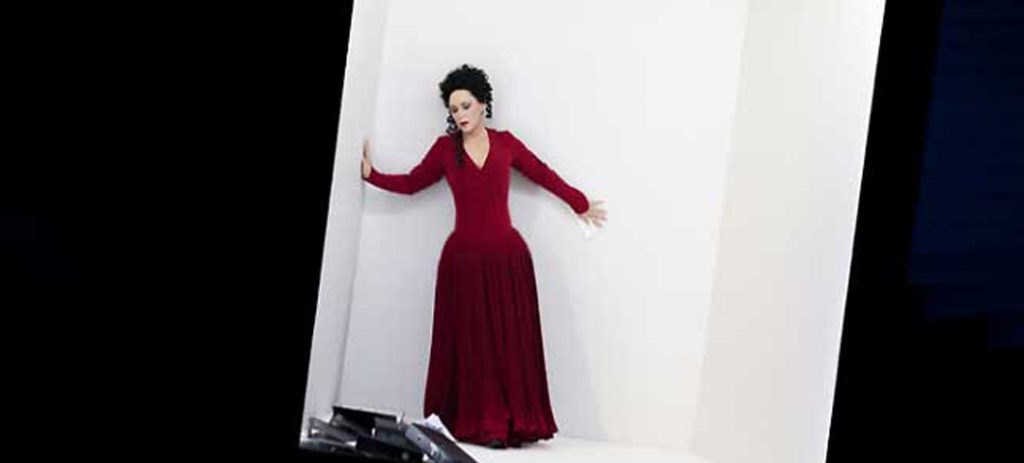CRITICAL ACCLAIM
"Elizabeth Blancke-Biggs truly succeeds in drawing the spectator to her with a charisma that makes one want her monologues and scenes to never end."

Den Norske Opera, Oslo
PUCCINI: TURANDOT
“Elizabeth Blancke-Biggs ‘is’ an Ice Princess so it is great for this soprano breaker of a role (fully on a par with Wagner’s Brünnhilde), she offers her miracle voice, as she tours with ease from the lyrical tactful to a voice of storm and steel.”
— Olav Egil Aune For Vårtland
“On stage we experience the star singer, the magnificent Elizabeth Blancke-Biggs as a glitzy Turandot. …The musical highlights are definitely Elizabeth Blancke-Biggs as Turandot, her opening aria “In questa reggia” was a brilliant peak, on a par was her presentation of the riddles!”
— Henning Høholt
Kulturkompasset
STRAUSS: ELEKTRA - Teatro Comunale di Bologna
Elektra could be defined as a ‘one woman show...‘
“…and Elizabeth Blancke-Biggs truly succeeds in drawing the spectator to her with a charisma that makes one want her monologues and scenes to never end. Her interpretation is breath-takingly fascinating, based on a declamation and use of text that would make a Shakespearian actor jealous. Her lirico-spinto voice, warm and convincing, fits the role perfectly, and the great professional knows how to keep her sound bright and smooth in the center of her voice, and in the beautiful high register, and then to obtain the maximum dramatic effect to darken the low, and medium low parts without taking away the musicality in this difficult role rich in quasi spoken, whispered, and loud passages, heading almost to screams.”
—liricamente.it
Elizabeth Blancke-Biggs is an Elektra who is well suited in every way to take on the difficulties of the part.
“The voice has the proper volume, the color shows a beautiful old style darkness appropriate for the role, the high notes are solid and brilliant, and the character is vividly and intricately drawn in its lucid madness cloaked by a fury that is more interior than exterior.”
— www.teatro.it
“…an optimal cast made this show great, not only vocally, but theatrically. Elizabeth Blancke-Biggs was superb in the title role. Her Elektra was expressively strong, thanks also to her voice which leaned toward the dark, but was well projected; her performance was sublime, perfectly illustrating the character, knowing how to show her tragic and mad side, and also her passionate and romantic one.”
— www.operaworld.es
“La voce di Elizabeth Blancke-Biggs ha dominato la scena, e la tessitura straussiana, con recitativo carismatico declinando efficacemente i vari tratti della personalità di Elektra.”
— Stefano Santini
Arte e Arti, 05/12/2015

Den Norske Opera, Oslo
STRAUSS: SALOME (role debut)
“Elizabeth Blancke-Biggs in the title role sounds magnificent.”
—Dagbladet
“Elizabeth Blancke-Biggs filled the demanding role spectacularly (…) I don’t think I’ve ever heard a soprano with such powerful low notes, something Blancke-Biggs showed off to great effect when begging Herodes for the head of Jochanaan. The final monologue was nothing less than ravishing. I would really love to see her back in Oslo, especially in Strauss’ heavier roles.”
—Bachtrack
“Musically this must be one of the opera literature’s most challenging female parts, and American Elizabeth Blancke-Biggs does a fantastic role. She has a voluminous voice which fills the character from bottom to top, and she has a theatrical radiance which makes her mediate humor and frustration in a balanced way.”
—VG
“Elizabeth Blancke-Biggs Salome exploded from Barbie doll innocence to a monster, with high, dramatic vocal temperature, certain in all the crazy leaps.”
—Vårt Land
“The singer’s terrific diction was so good I didn’t need subtitles … What I also noticed was the huge theatrical pleasure, which was enrapturing. I have never experienced anything like it, and it was the singers that triggered my exaltation. The evening’s main role was sung by soprano Elizabeth Blancke-Biggs. She certainly was its highlight. Her vocal splendor and strength were Salome worthy and she often formed the merciless role with beautiful bel canto singing.”
—Kulturkompasset
“The role as Salome is extremely hard to perform. Its physical standards make it almost impossible to understand that a living human being can get through with its throat intact. We therefore understand why tonight’s Salome, American Elizabeth Blancke-Biggs, lifted her arms in exultation as after an athlete’s achievement when the performance was over. She finished impressively. In some parts she seemed to rest, especially in the lower vocal parts – she is not a contralto! – but anything else would have been almost unthinkable.”
—Kulturspeilet
Salome – Orchesta Sinfonica Nacional, Palacio de Bellas Artes Mexico City
A great, truly mythical Salome...
“Blancke-Biggs gave a princess who vocally and histrionically weaved the superficial, visible sensuality, with a deep conception of desire, resulting in a delicious version that plunged the viewer into their innermost aversions and led him to lose his mind.”
—José Noé Mercado
Una Voce Poco Fa, 07/2015
La partitura de Strauss lo cuenta todo y ellos acudieron a ella con suficiente honestidad, sin dejar de ser fieles a su propia lectura
“Los tres brillaron tanto en lo musical, precisos, imponentes, convincentes, como en la poca escena que pudieron realizar. Blancke-Biggs como Salomé, ella con la suficiente exuberancia a la que se puede acudir en un espacio tan reducido –y a las posibilidades que todavía le quedan para, digamos, escenificar la esperada Danza de los siete velos–, con una voz que todavía es poderosa y que mantiene un color que resulta esencial para esta partitura.”
—Iván Martínez
El Universal, 04/07/2015
“Hoy, Salomé representa como dice en cierto momento su protagonista, ‘el misterio del amor es más grande que el misterio de la muerte’, el personaje enigmático que a todas conquista, tanto en la escena teatral como en la operística, es el papel más codiciado para una soprano como Elizabeth Blancke-Biggs, quien reconocida por su poderoso caudal y coloratura impactante es considerada una de las voces que dominan el dramatismo de la escena operística. Una artista consagrada con una larga trayectoria que la ha llevado a participar en infinidad de óperas como esta misma Salomé con la Den Norske Opera de Oslo.”
—Claudia Magun
InterEscena, 26/06/2015

Castleton Festival, 12/07/2013
PUCCINI: LA FANCIULLA DEL WEST
“T here was a real-life, last-minute rescue-by-soprano for the Fanciulla production on July 12. Elizabeth Blancke-Biggs made it to Castleton from New York mere hours before curtain and sang the title role from the pit. She met the score’s most taxing demands with sturdy top notes that contained a glint of steel, but she was even more impressive producing warm, subtle nuances for the gentler moments.”
—TIM SMITH
Opera News, 10/2013
Puccini’s La Fanciulla del West - Opera Holland Park, London
A bull’s-eye, then, to Opera Holland Park for finding a Minnie at all, leave alone one as good as Elizabeth Blancke-Biggs
“She is, in a word, terrific – mature enough to make this earth-mother figure believable, youthful and spirited enough to have us choking back the tears at her first kiss. And still thinking that a shotgun wedding might be on the cards. Minnie has the best entrance in all opera: … her rolling theme swelling proudly from the orchestra … Blancke-Biggs, has more than enough voice and vocal authority to hold her own against the many different male timbres. The voice has the plangency and steely core to make its presence felt, the smoky chest- voice colour to give it depth and warmth, and a free and uninhibited top. When she sings of her humble origins and her dream to “rise as high as the stars”, Puccini has her do just that. Blancke-Biggs wrings pathos, not bathos, from all of her big moments. Pleading for her lover’s life in the masterly final scene, she nails her “boys”, and us, with the line: “None of you ever said, ‘that’s enough’, when I gave you the best years of my youth.” Their response finally makes this a five-handkerchief opera.”
— The Independent
The American Elizabeth Blancke-Biggs is an impressive Minnie in Puccini’s frontier saga...
“(She) impressed with her authority, and incisive soprano. This girl of the Golden West managed to make Puccini and Belasco’s proposition at least half-way plausible.”
— The Times
“Elizabeth Blancke-Biggs is the beating heart of Puccini’s opera set in the wild west … (she) has the required vocal weight and dramatic sense: here you feel, is opera’s Mae West, quite capable of controlling the rowdies without the Bible-bashing the composer forces on her.“
— The Evening Standard
“The performances, by and large, are terrific … Blancke-Biggs sings Minnie’s music with thrilling abandon.”
— The Guardian
“The American soprano Elizabeth Blancke-Biggs gave a searching performance as Minnie, tough but very vulnerable …”
—The Sunday Telegraph
“The American soprano Elizabeth Blancke-Biggs was a committed Minnie, bringing to the role a voice that was ample, poised, and capable, even stirring.”
— Opera (UK)
“Elizabeth Blancke-Biggs’s Minnie may look slim and pretty in Act One, but by Act Two her authority and her anger at being duped by Dick Johnson was totally convincing. Minnie’s Valkyrie-like entrance and Minnie’s sermon and farewell to the miners were fully delivered.”
— Classical Source
“Elizabeth Blancke-Biggs sings Minnie with a glorious tone …”
— Metro
“Elizabeth Blancke-Biggs took Minnie’s role by storm …”
— The Spectator
“Elizabeth Blancke-Biggs, fielding an enviably secure soprano, is a heroic Minnie.”
— The Stage
“Elizabeth Blancke-Biggs sang with bullet like force … ”
— The Financial Times

Florida Grand Opera
PUCCINI’S LA FANCIULLA DEL WEST
“A s Minnie, Elizabeth Blancke-Biggs was a veritable powerhouse. Her gorgeous lyrico-spinto soprano gleamed in Puccini’s stratospheric flights. Blancke-Biggs’ rapturous sound literally enveloped the stage. A flamboyant, charismatic stage presence, the soprano made the poker scene a real musico-dramatic tour de force.”
—Lawrence Budmen, The Miami Herald”
“With her beautiful voice, musical intelligence, and stunning theatricality, Blancke-Biggs is set for operatic stardom!”
— Entertainment News
VERDI MESSA DA REQUIEM - Los Angeles Master Chorale, Disney Concert Hall
The fearless soprano of Elizabeth Blancke-Biggs...
“… stormed the heights and plumbed the depths with a skillfully deployed voice, expressing real terror in Tremens factus sum ego and much worry in the nervous chants.”
— Los Angeles Times

Grand Théâtre de Gèneve
VERDI: NABUCCO
“…the revelation of the evening: in the Nabucco presented by the Grand Theatre de Geneve, Elizabeth Blancke-Biggs and was simply extraordinary. The soprano audaciously establishes a hallucinatory Abigaille with a voice that is formidably of long extension, with audacious, aggressive high notes, and dark, meaty, and supple low notes. One could reproach her for a lack of nuances, and a preference for aggression, sometimes to the limits of good taste, but, these excesses bring to the character a flamboyant charisma, an extraordinary quality, which glues one to her. On the other hand, her interpretation of the final aria, with her mezza voce singing, the likes of which one has not heard before, stand in musical relief against the rest of the evening, revealing the emotional fissures of the character in a very moving way.”
—Tania Bracq
Forum Opéra
Le magazine de l’Opera et du monde lyrique, 03/03/2014
VERDI: MACBETH - Teatro Solis, Montevideo, Uruguay
The American soprano Elizabeth Blancke-Biggs as Lady Macbeth was the most outstanding character of the evening.
“Possessor of an admirable vocal range, which was equally surprising in both its low and high registers, she demonstrated an absolute technical mastery, and a particular ability to personify this dramatic character. In the ensemble scenes her powerful high notes soared above the orchestra, and chorus. Her ability to immerse herself in the character was amazing. From the opening aria to the Sleepwaking Scene of the final act, it was all fantastic.”
–El Pais

Teatro Municipal, Santiago, Chile
LADY MACBETH IN MACBETH
“Macbeth” en ascenso
“Here arrived Elizabeth Blancke-Biggs the American who plays that role so grave, displaying an increasing accumulation of virtues, both in vocal and theatrical performance. This Lady convinces and impresses, imposing with a voice of great quality and extremely good projection in the wide tessitura, in addition to giving a performance where you breathe completely an air of evil and ambition.”
– Mario Córdova
Las Últimas Noticias, Aug. 2010 (translation)
Version estalar de “Macbeth” de Verdi
“Elizabeth Blancke-Biggs the American soprano, was a great Lady Macbeth, in full possession of the role, with a voice she handles with intelligence, both in its beautiful lows as in the treble, and with a capacity to sing beautifully in pianissimo, she highlights the letter scene. She becomes a manipulative and ambitious woman, using a hard coldness in the banquet scene, for the visions of her husband, and in the mad scene with the scarlet thread, before dying. The enthusiastic applause from the public, justly rewarded, with a cast who lived each of the ups and downs of the tragedy, in a production that has generated controversy for its timelessness and daring, but all agreeing in its full perfection and visual impact of each one of the resources used by the regisseur.”
– Gilberto Ponce Vera
Visiones Criticas, Aug. 2010 (translation)

Río de Janeiro
BELLINI: NORMA
Elizabeth Blancke-Biggs, is a natural diva.
“A star in every way. It was an overwhelming Norma. Full of impetus and ferocity. Ease of vocality, in acuti, and in high pianissimos, seriously admirable in consistency, and above all, technique and style.
Her Casta Diva, followed by the cabaletta – “Ah! Bello a me”, conquered the public! Then it was just success after success: the 1st duet with Adalgisa and the moment in the trio – “Oh! non tremar, o perfido”, was unique. At the beginning of the second act, her contrasts in the recitative – “Dormono entrabi”, followed by the aria – “Teneri figli”, were dazzling. What a great interpreter. From the duet “Mira, O Norma”, already mentioned, we passed to the end. Her confidence in :”Ei tornerà Si, mia fidanza è posta” – unleashed to the exciting end: Duet with Pollione: “In mia man alfin tu sei” – and the revelation – “All’ira vostra nuova vittima io svelo” – the other duet with Pollione – “Qual cor tradisti, Qual cor perdesti “- She then went to the sad end with – “Deh! Non volerli vittime”, all these resulted in Elizabeth receiving a standing ovation (deserved) for her magnificent performance. Bravíssima!”
– www.brasilclassico.com.br
BELLINI: NORMA, Palm Beach Opera
Blancke-Biggs was every inch Bellini’s imperious druid priestess
“Her sizable dramatic soprano was equally flexible in stentorian declamation and radiant cantilena. Opening with a broadly phrased Casta diva, the soprano went from strength to strength, negotiating the composer’s coloratura leaps and roulades with ease. Yet it was her soft, exquisitely burnished singing that melted the heart. A mistress of Bellini’s long, arching vocal line, she made Norma’s final sacrifice deeply moving; the heartbreaking final duet with tenor Renzo Zulian soaring into magical eloquence.
In the duet Mira, o Norma and succeeding cabaletta, Swenson and Blancke-Biggs produced the kind of gorgeous, seamlessly produced vocalism of which legends are made. The first night audience awarded vociferous, cheering ovations to both artists — two sopranos who are truly at the top of their artistic powers.”
— Lawrence Budmen, Music and Vision Daily
Soprano Elizabeth Blancke-Biggs portrayed the Druid priestess, Norma
“She possesses the necessary prodigious vocal technique required for the demanding role. She took an icy, steely take on the role — a bit of the Callas cutting edge. Her opening act, Casta Diva, was clean and precise. She warmed as the evening progressed, seeming to increase the emotional depth of her performance. Her second act duet, Mira, o Norma, touched on the sublime. The final act, In mia man alfin tu sei, was commanding and forceful. Ms. Blancke-Biggs made the most of the pathos of the final scene.”
— R. Spencer Butler
The Daily News, January 24, 2009

Opera Holland Park
BELLINI'S NORMA
Elizabeth Blancke-Biggs’ Norma … has a strong, penetrating soprano, secure of coloratura and legato.”
— Opera Japonica
PUCCINI: TOSCA
Excellent ‘Tosca’ at FGO
“We were told in advance to expect magnificent voices. All were great. The Soprano Elizabeth Blancke-Biggs assumed the title role. Blancke-Biggs manifested a Floria Tosca hard to top, both in stage presence and projection of the voice, both agile and intense. She began a little cool but very soon the engine warmed up to give each note its expressive due. Her delivery of the aria “Vissi d’arte” was unparalleled, as was the delivery of her duets and trios in acts 1 and 3.”
— Ariel Ramos,
Diario Las Americas, Feb. 11, 2008 (translated from the Spanish)